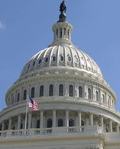
ASTMH continues to work with peer organizations to make its views known to Congress and the Biden administration. Letters that ASTMH led or joined include:
- Three Global Health Technologies Coalition (GHTC) letters on Fiscal Year 2022 funding –
- One to the House Labor-HHS Appropriations Subcommittee calling for robust funding for NIH, CDC, and BARDA.
- One to the House State and Foreign Operations Appropriations Subcommittee asking the subcommittee to sustain and protect funding for the Global Health Programs account at the State Department and USAID.
- One to the Senate Defense Appropriations Subcommittee calling for sustained and protected global health research funding within the Defense Health Program and Congressionally Directed Medical Research Program.
- A Research!America letter to President Biden requesting his support for the Research Investment to Spark the Economy (RISE) Act (H.R.869/S.289), which would provide $25 billion restore research capacity to pre-pandemic levels.
- A letter to both the House and Senate Labor-HHS Appropriations Subcommittees asking for $250 million for CDC’s Data Modernization Initiative (DMI).
- A letter by the Entomological Society of America to both the House and Senate Labor-HHS Appropriations Subcommittees requesting at least $10 billion for CDC in FY22, with at least $82.603 million in funding for the Division of Vector-Borne Diseases (DVBD), in order to fully fund the $30 million authorized by the Kay Hagan Tick Act.
- A letter led by the American Society for Microbiology asking House and Senate appropriators to support $60 million for the CDC’s Advanced Molecular Detection program.
- A letter from Public Citizen to President Biden asking him to create a global vaccine manufacturing program and to build global vaccine infrastructure.
Read more:
Biden Administration Releases Topline Budget Requests
Gayle Smith Named Head of Global COVID-19 Response
Samantha Power to Receive Hearing for USAID Administrator
Call for Global Pandemic Treaty
House Foreign Affairs Committee Passes Global Health Security Act
Biden Administration Releases Topline Budget Requests
On Friday, April 9, the Biden administration released its requests for agency funding levels in FY22 as part of the annual budget process. If accepted by Congress, which is by no means assured, the Biden budget would see the Department of Health and Human Services receive a 23.5% increase over FY21, which equates to $25 billion. Of that increase, $6.5 billion would go toward the creation of the Advanced Research Projects Agency for Health (ARPA-H), which would work to translate NIH research into marketable products. The NIH gets a further $2.5 billion boost, on top of the ARPA-H funding, for a total $51 billion, and the CDC gets a $1.6 billion increase to $8.7 billion. This would be the largest CDC budget authority increase in 20 years.
On international assistance, the Biden budget seeks $63.5 billion for the State Department and international programs, which is a $6.8 billion increase over FY21. It also states that this funding can go toward the World Health Organization, U.N. Population Fund, and other global entities, without specifying amounts. Global health programs receive $10 billion, with almost $1 billion of that amount for global health security programs.
Gayle Smith Named Head of Global COVID-19 Response
Secretary of State Antony Blinken announced the appointment of ONE Campaign CEO and former USAID Administrator Gayle Smith as a new Coordinator for Global COVID Response and Health Security. Secretary Blinken said that with Smith “we’ll work with partners to reform and strengthen the institutions and systems that safeguard global health security.”
Samantha Power to Receive Hearing for USAID Administrator
After a two-week recess, the Senate Foreign Relations Committee will hold a vote on Samantha Power to be USAID Administrator on Thursday, April 15.
Call for Global Pandemic Treaty
The World Health Organization and roughly two dozen national governments called for an international treaty on pandemics on March 30. The treaty would be formulated as a framework convention, as outlined in the WHO Constitution, and focus on research, data sharing, supply chains, and vaccine formulas.
Notable supporters include Chile, France, Germany, Indonesia, South Africa, South Korea, and the United Kingdom.
House Foreign Affairs Committee Passes Global Health Security Act
On March 25, the House Foreign Affairs Committee passed an amended version of the Global Health Security Act. The amendments are designed to have the legislation conform to the global health measures President Biden outlined in his National Security Directive 1 upon taking office. The bill passed out of committee on a voice vote and directs the administration to work to establish a Fund for Global Health Security and Pandemic Preparedness.